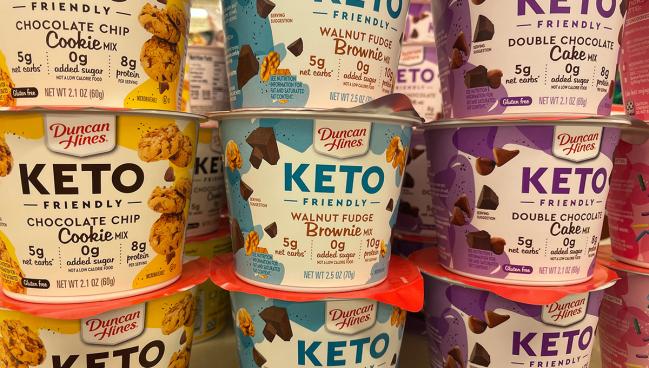Sugar Substitute Erythritol Linked to Cardiac Risk
The zero-calorie sweetener, a chemical also made endogenously, is associated with thrombosis, MI, and stroke, researchers warn.

Increased blood levels of erythritol, both when produced endogenously and when ingested as a sugar substitute, is associated with an uptick in adverse cardiovascular events, according to new metabolomics data.
“Just like cholesterol—where endogenous levels that you can measure in the plasma can predict future development of disease, and you can then ingest cholesterol and raise your cholesterol level in the same way—erythritol is an endogenous compound that every person makes, it is part of our cell metabolism,” senior author Stanley Hazen, MD, PhD (Cleveland Clinic, OH), explained to TCTMD. “But some of it leaks out of the cell and is measured in the plasma and what we see is that the level of erythritol can affect the future development of adverse cardiovascular events like heart attack, stroke, and death.”
While Hazen is convinced that their findings are mostly related to endogenous erythritol, and it’s not yet known how that can be altered, the potential danger lies in the fact that many so-called health-conscious foods now use erythritol—a zero-calorie sugar alcohol belonging to a broader group called polyols—to promote low-calorie, low-carb, and ketogenic diets. These compounds, in combination with other cardiovascular risk factors including age, create a scenario ripe for thrombosis, he said.
In a secondary analysis of healthy adults given a drink containing the sweetener, plasma levels of erythritol remained 1,000-fold higher for hours after ingestion and remained high for days. Because of effects like these, Hazen said, he “without a doubt” advises against eating or drinking anything with added erythritol. “Especially for people who are at risk for clotting events like patients with cardiovascular disease or a high burden of cardiovascular risk factors, [they] should be avoiding anything with erythritol on the label,” Hazen stressed.
As for what might be a better option, even for younger, healthy adults, “the safest alternative is just sugar itself or honey, but in moderation,” Hazen said. “There is nothing wrong with eating a little bit of sugar as long as you watch the calories, [and] the glucose, if you are diabetic.”
Evaluating Erythritol
For the study, published online last month in Nature Medicine, Hazen, Marco Witkowski, MD (Cleveland Clinic), and colleagues undertook untargeted metabolomics studies in 1,157 patients (mean age 65 years; 63.6% male) undergoing cardiac risk assessment to determine which compounds might be associated with MACE (comprised of death, nonfatal MI, and stroke).
Multiple polyol sweeteners, with erythritol at the top of the list (HR 3.22; 95% CI 1.91-5.41), were associated with an increased risk of MACE at 3 years. This was confirmed in both independent US (n = 2,149; adjusted HR 1.80; 95% CI 1.18-2.77) and European (n = 833; adjusted HR 2.21; 95% CI 1.20-4.07) targeted metabolomics analyses comparing patients in the fourth versus first quartile of erythritol levels. The findings also held true in multiple subgroups, including when stratified by sex.
In their exploratory analysis looking into how erythritol levels might affect platelet function and thrombosis, the researchers gave eight healthy adult volunteers a drink sweetened with 30 g of erythritol, an amount on par with what the US Food and Drug Administration estimates is consumed by the average American. Median plasma levels of erythritol were low at baseline (3.84 µM), but they skyrocketed 1,000-fold higher for hours after ingestion with levels measured at 5.85 mM at 30 minutes and remained elevated for more than 2 days for all participants.
Notably, Hazen said, the researchers “were not searching for anything related to artificial sweeteners. That just showed up. What instead we have been working on is trying to discover new pathways that contribute to residual cardiovascular risk.” However, erythritol became a powerful target as a result that deserves further research, especially as its use climbs in mainstream diet food products, he said.
One particularly important pathway of study will be what the long-term effects of erythritol exposure are on the risk of MACE as well as that of coronary heart disease, Hazen said. “None of the sugar alcohols or artificial sweeteners have ever been studied in these kinds of long-term studies,” he explained, as they are not treated like pharmaceuticals. “But when you start taking massive amounts of things, even if they are natural products, and then you are changing plasma levels a 1,000-fold, I do not think you can really consider them as food additives anymore.”
It’s time for regulators to reevaluate pathways for these compounds, Hazen urged.
As far as research, studies of erythritol will be tricky because it is not consistently included in food labels, which “also impacts the ability for consumers to be informed and try to do well by themselves and be able to avoid it,” he said, adding that whether a similar class effect is seen with multiple sugar alcohols will also need to be studied.
Yael L. Maxwell is Senior Medical Journalist for TCTMD and Section Editor of TCTMD's Fellows Forum. She served as the inaugural…
Read Full BioSources
Witkowski M, Nemet I, Alamri H, et al. The artificial sweetener erythritol and cardiovascular event risk. Nature Med. 2023;Epub ahead of print.
Disclosures
- Hazen and Witkowski report no relevant conflicts of interest.





Comments